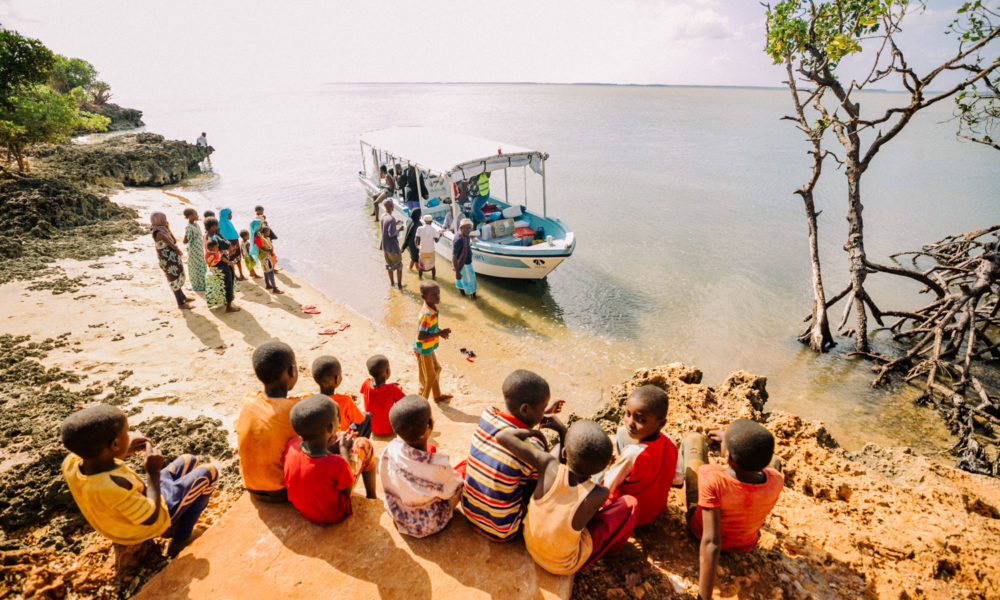
Kenyan humanitarian Umra Omar has put her entrepreneurial spirit and energy into a social enterprise that provides healthcare to marginalized and indigenous communities within the Lamu Archipelago in Kenya. The archipelago is a group of 65 islands over 6,474 square kilometers (around 2,500 square miles) near the northern coast of Kenya. Omar’s organization, Safari Doctors, sends doctors by boat to the small, isolated islands so they can administer primary care to the villagers.
According to Omar, who founded Safari Doctors in 2015, “If you look at a village … like Kiunga, where if you have any complication, require a C-section or anything, and you’re trying to come to the main hospital, it’s about an 8-hour big boat ride, or you’re hiring a speedboat, $300 for a one-way ticket.” So instead, the non-profit organization takes healthcare to the people, providing monthly mobile clinics for people “who would otherwise be reliant on village dispensaries with only basic medicines.” In Kenya, almost 72% of the population lives in rural areas, according to the World Bank.
The enterprise includes a dedicated team of staff and medical volunteers who provide healthcare services where none exist otherwise. Safari Doctors’ mission is “to provide affordable and appropriate healthcare to marginalized communities in Lamu County. The vision is to have thriving communities in remote settings, with adequate access to affordable health solutions and improved livelihoods.”
“Together with outpatient services offered at the Safari Doctors Medical Centre in Shela, on Lamu Island, we can reach up to 2,000 patients every month with primary health services, including vaccines and family planning.”
– Safari Doctors
In 2021, Safari Doctors accomplished the following:
But in addition to reaching thousands of villagers every month, providing such services as immunization, family planning and gynecology services as well as dental care, the organization also has a veterinary department to promote “One Heath.” It recognizes that “human health is connected to the health of animals and that of our environment.” Umra Omar explains: “If you’re talking of rural health care, you have to talk about animals – not only as a source of livelihood, but also the issues of zoonosis [disease that can be transmitted to humans from animals] and preventing animal-human transfer of diseases.”
In 2017, the UN in Kenya named Omar the United Nations Person of the Year, “for the outstanding efforts and commendable work providing medical care to marginalized communities in the far reaching areas of Lamu.”
| Cookie | Duration | Description |
|---|---|---|
| cookielawinfo-checbox-analytics | 11 months | This cookie is set by GDPR Cookie Consent plugin. The cookie is used to store the user consent for the cookies in the category "Analytics". |
| cookielawinfo-checbox-functional | 11 months | The cookie is set by GDPR cookie consent to record the user consent for the cookies in the category "Functional". |
| cookielawinfo-checbox-others | 11 months | This cookie is set by GDPR Cookie Consent plugin. The cookie is used to store the user consent for the cookies in the category "Other. |
| cookielawinfo-checkbox-necessary | 11 months | This cookie is set by GDPR Cookie Consent plugin. The cookies is used to store the user consent for the cookies in the category "Necessary". |
| cookielawinfo-checkbox-performance | 11 months | This cookie is set by GDPR Cookie Consent plugin. The cookie is used to store the user consent for the cookies in the category "Performance". |
| viewed_cookie_policy | 11 months | The cookie is set by the GDPR Cookie Consent plugin and is used to store whether or not user has consented to the use of cookies. It does not store any personal data. |

This is wonderful. The better healthcare and education that can be provided to all peoples of the world, the better off the entire population of the world will be. Programs like this should be supported by and celebrated by ALL of us.
Way to go Umra!!!